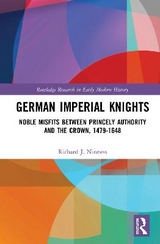German Imperial Knights
Noble Misfits between Princely Authority and the Crown, 1479–1648
Seiten
German imperial knights attempted to turn the world on its head through their challenges to authority. They refused to obey laws that violated custom. During the Reformation, they embraced religious tolerance and stood up to their princely adversaries, becoming champions of the Catholic Church.
The German imperial knights were branded disobedient, criminal, or treasonous, but instead of finding themselves on the wrong side of history, they resisted marginalization and adapted through a combination of conservative and progressive strategies. The knights tried to turn the elite world on its head through their constant challenges to the princes in the realms of both culture and governance. They held their own chivalric tournaments from 1479-1487, and defied the emperor and powerful princes in refusing to obey laws that violated custom. But their resistance led to a series of disasters in the 1520s: their leaders were hunted down and their castles destroyed. Having failed on their own, they turned to Emperor Charles V in the 1540s and the imperial knighthood was formed. This new status stabilized their position and provided them with important rights, including the choice between Lutheranism and Catholicism. During the Reformation era (1517-1648), no other German group embraced diversity in religion like the imperial knights. Despite the popularity of Protestantism in the group, they stood up to their princely adversaries, now Protestant, becoming champions of the Catholic Church and proved themselves just as staunch defenders of the Church as the Habsburg and Wittelsbach dynasties.
The German imperial knights were branded disobedient, criminal, or treasonous, but instead of finding themselves on the wrong side of history, they resisted marginalization and adapted through a combination of conservative and progressive strategies. The knights tried to turn the elite world on its head through their constant challenges to the princes in the realms of both culture and governance. They held their own chivalric tournaments from 1479-1487, and defied the emperor and powerful princes in refusing to obey laws that violated custom. But their resistance led to a series of disasters in the 1520s: their leaders were hunted down and their castles destroyed. Having failed on their own, they turned to Emperor Charles V in the 1540s and the imperial knighthood was formed. This new status stabilized their position and provided them with important rights, including the choice between Lutheranism and Catholicism. During the Reformation era (1517-1648), no other German group embraced diversity in religion like the imperial knights. Despite the popularity of Protestantism in the group, they stood up to their princely adversaries, now Protestant, becoming champions of the Catholic Church and proved themselves just as staunch defenders of the Church as the Habsburg and Wittelsbach dynasties.
Richard J. Ninness is Associate Professor at Touro College in New York City. He is the author of Between Opposition and Collaboration: Nobles, Bishops, and the German Reformations in the Prince-Bishopric of Bamberg (2011).
Introduction 1
1 Free Knights’ Dilemma 17
2 Marginality and Subversion 52
3 Institutionalization of a Peculiar Status in the Midst
of the Reformation 86
4 Grumbach’s Attempt at a Nobles’ Revolution, Its
Failure, and a New Status Quo 136
5 Imperial Knights and Imperial Church: Their
Strategies in the Reformation Era 177
6 Imperial Knighthood, Multiconfessionalism, and the
Counter-Reformation 207
Conclusion: Imperial Knights as Noble Misfits 257
Bibliography 270
Index 300
| Erscheinungsdatum | 15.01.2021 |
|---|---|
| Reihe/Serie | Routledge Research in Early Modern History |
| Zusatzinfo | 10 Halftones, black and white; 12 Illustrations, black and white |
| Verlagsort | London |
| Sprache | englisch |
| Maße | 156 x 234 mm |
| Gewicht | 453 g |
| Themenwelt | Geschichte ► Allgemeine Geschichte ► Neuzeit (bis 1918) |
| Geisteswissenschaften ► Geschichte ► Regional- / Ländergeschichte | |
| Geschichte ► Teilgebiete der Geschichte ► Militärgeschichte | |
| ISBN-10 | 0-367-27270-9 / 0367272709 |
| ISBN-13 | 978-0-367-27270-8 / 9780367272708 |
| Zustand | Neuware |
| Haben Sie eine Frage zum Produkt? |
Mehr entdecken
aus dem Bereich
aus dem Bereich
Europa 1848/49 und der Kampf für eine neue Welt
Buch | Hardcover (2023)
DVA (Verlag)
48,00 €
Giordano Bruno - ein ketzerisches Leben
Buch | Hardcover (2024)
C.H.Beck (Verlag)
29,90 €
Kunst und Gesellschaft an der Schwelle zur globalen Welt
Buch | Hardcover (2024)
Klett-Cotta (Verlag)
42,00 €




